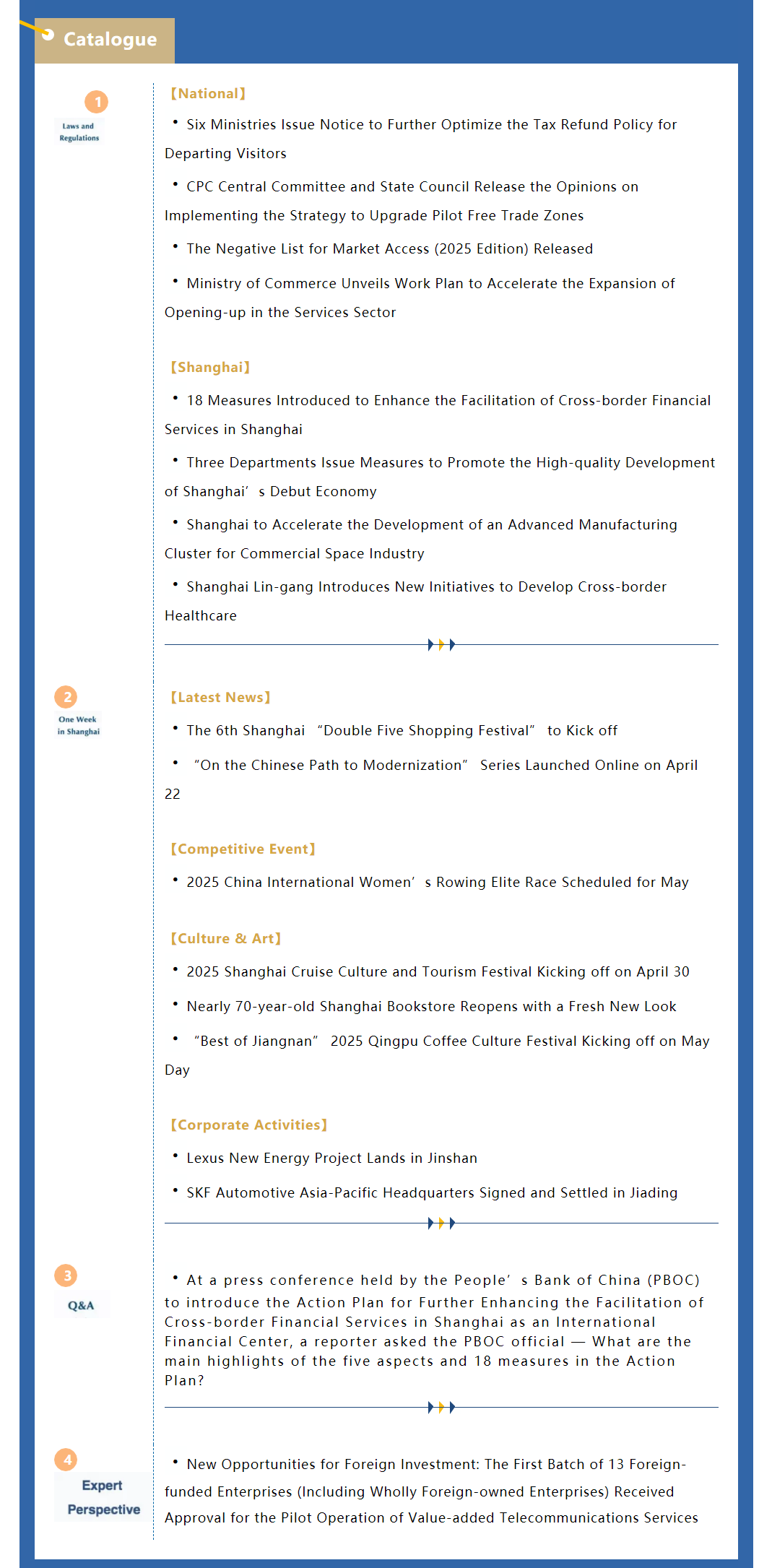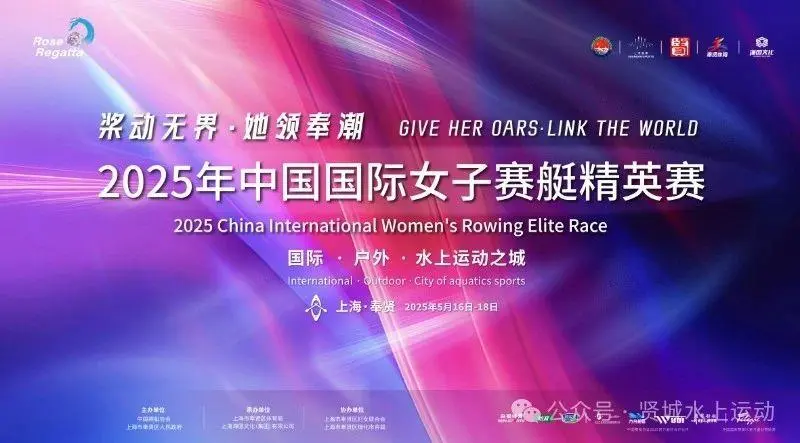Shanghai Weekly Bulletin (Issue 92, No.5, April 2025) ( 2025.04.30 )
Issue 92
Shanghai Weekly Bulletin
No.5,April 2025
Shanghai Weekly Bulletin is an information service presented by the Foreign Affairs Office of Shanghai Municipal People’s Government in collaboration with Wolters Kluwer to foreign-funded enterprises, foreign-related institutions as well as people from overseas living in Shanghai. Covering major national and Shanghai foreign-related news, event information, policy Q&A and interpretations in the past week, it keeps you up-to-date with the latest foreign-related policies and developments in Shanghai.

Laws and Regulations
【National】
1.Six Ministries Issue Notice to Further Optimize the Tax Refund Policy for Departing Visitors
【Keyword: Tax refund】
On April 26, six central government departments, including the Ministry of Commerce (MOFCOM), jointly issued the Notice on Further Optimizing the Tax Refund Policy for Departing Visitors and Expanding Inbound Consumption. The notice aims to expand the number of designated tax refund stores, enrich the supply of tax-refundable goods, and enhance the quality of tax refund services.
Source:MOFCOM
https://www.mofcom.gov.cn/zwgk/zcfb/art/2025/art_a1609daf127b47c1aec0da459b76b331.html
2.CPC Central Committee and State Council Release the Opinions on Implementing the Strategy to Upgrade Pilot Free Trade Zones
【Keywords: Pilot free trade zones】
Recently, the CPC Central Committee and the State Council released the Opinions on Implementing the Strategy to Upgrade Pilot Free Trade Zones. The document sets forth key initiatives to enhance overall competitiveness of foreign trade, promote investment liberalization and facilitation, build a high-standard ecosystem for scientific and technological innovation, and advance the efficient, convenient, and secure flow of data.
Source:International Services Shanghai
https://english.shanghai.gov.cn/en-PolicyInsights/20250422/b7edf7f54afc449183e5e56eb2706e17.html
3.The Negative List for Market Access (2025 Edition) Released
【Keywords: Market access, Negative list】
The National Development and Reform Commission (NDRC), together with two other government departments, has issued the Negative List for Market Access (2025 Edition) recently. The 2025 Edition reduces the number of prohibited and restricted items from 117 in the 2022 Edition to 106, with the number of specific national-level management measures decreasing from 486 to 469, and local-level measures decreasing from 36 to 20.
Source:NDRC
https://www.ndrc.gov.cn/xxgk/zcfb/ghxwj/202504/t20250424_1397358.html
4.Ministry of Commerce Unveils Work Plan to Accelerate the Expansion of Opening-up in the Services Sector
【Keywords: Services sector】
Recently, the MOFCOM released the Work Plan for Accelerating Comprehensive Pilots for the Expansion of Opening-up in the Services Sector. The document outlines 155 pilot tasks across various dimensions, including opening up key service sectors and promoting innovative development of industries. It covers a wide range of areas such as telecommunications, healthcare, finance, commerce, culture and tourism, and transportation.
Source:MOFCOM
https://www.mofcom.gov.cn/zwgk/zcfb/art/2025/art_f504ada2eb5e4e88b4b2093ecf418595.html
【Shanghai】
1.18 Measures Introduced to Enhance the Facilitation of Cross-border Financial Services in Shanghai
【Keywords: Cross-border finance】
Recently, the People’s Bank of China, together with two other government departments and the Shanghai Municipal People’s Government, jointly issued the Action Plan for Further Enhancing the Facilitation of Cross-border Financial Services in Shanghai as an International Financial Center. The Plan sets out 18 key measures to improve five areas of services, including cross-border settlements, exchange rate hedging, financing, insurance, and comprehensive financial services. These measures are of significant importance to accelerating Shanghai’s development as an international financial center.
Source: International Services Shanghai
https://english.shanghai.gov.cn/en-PoliciesandRegulations/20250421/eb271f16d3be47888d2e6b2674115631.html
2.Three Departments Issue Measures to Promote the High-quality Development of Shanghai’s Debut Economy
【Keywords: Debut economy】
Recently, the Shanghai Municipal Commission of Commerce, together with two other departments, released the Measures for Further Promoting the High-quality Development of Shanghai’s Debut Economy. The document introduces three new initiatives aimed at enhancing the high-quality development of the debut economy, i.e., elevating the standard of product debuts at exhibitions, piloting the facilitation measures for inspection of debut imported consumer goods, and piloting a fast-track customs clearance model for debut imported cosmetics. These measures took effect on April 23, 2025, and will remain valid until April 30, 2029.
Source: Shanghai Municipal Commission of Commerce
https://sww.sh.gov.cn/zwgkhsgwj/20250423/d7ef3d5977554543b3475cca89f99cf1.html
3.Shanghai to Accelerate the Development of an Advanced Manufacturing Cluster for Commercial Space Industry
【Keywords: Commercial space】
Recently, the Shanghai Municipal Commission of Economy and Informatization, together with three other departments, issued the Measures for Accelerating the Development of an Advanced Manufacturing Cluster for the Commercial Space Industry in Shanghai. The document identifies four key areas for development, namely, commercial rockets, commercial satellites, intelligent terminals, and application services, and sets out 12 supporting measures across four dimensions.
Source: Shanghai Municipal Commission of Economy and Informatization
4.Shanghai Lin-gang Introduces New Initiatives to Develop Cross-border Healthcare
【Keywords: Cross-border healthcare】
Recently, the Lin-gang Special Area of the China (Shanghai) Pilot Free Trade Zone released the Implementation Plan for Developing Cross-border Healthcare and Advancing the Development of the International Medical Services Hub. The Plan outlines 12 key tasks across three dimensions: promoting the concentration of high-quality medical service resources, facilitating the efficient flow of cross-border healthcare service elements, and enhancing the internationalization of medical services.
Source: Shanghai Lin-gang
One Week in Shanghai
【Latest News】
1. The 6th Shanghai “Double Five Shopping Festival” to Kick off
【Keywords: Double Five Shopping Festival】

The 6th Shanghai “Double Five Shopping Festival” will run from the end of April through the end of June. This year’s festival will feature participation from over 1,000 enterprises and several thousand brands, with more than 1,000 distinctive activities.
Source: International Services Shanghai
https://english.shanghai.gov.cn/en-Latest-WhatsNew/20250424/17e5b27b0fc84eae87edc1ef6aa42009.html
2. “On the Chinese Path to Modernization” Series Launched Online on April 22
【Keywords: On the Chinese Path to Modernization】
The short video series On the Chinese Path to Modernization were launched across all online platforms on April 22. The series vividly illustrates and analyzes the practical experiences and significant achievements of Chinese modernization and the comprehensive deepening of reform. It showcases to the world the promising future of Chinese modernization and the new vitality of Shanghai’s modernization efforts.
Source:Shanghai Release
【Competitive Event】
1. 2025 China International Women’s Rowing Elite Race Scheduled for May
【Keywords: International Women’s Rowing】

The 2025 China International Women’s Rowing Elite Race will be held from May 16 to 18 at Jinhuigang in Fengxian District, Shanghai. Positioned as the world’s only official professional rowing event dedicated exclusively to women, it is one of the three major rowing competitions hosted in Shanghai.
Source:Shanghai Fengxian
【Culture & Art】
1. 2025 Shanghai Cruise Culture and Tourism Festival Kicking off on April 30
【Keywords: Shanghai Cruise Culture and Tourism Festival】
The 2025 Shanghai Cruise Culture and Tourism Festival will be held from April 30 to May 20 at Baoshan Riverside. Centering on three core themes — debuts, revitalization, and integration, this year’s festival will feature coordinated cruise-and-waterfront events around the clock, offering trendy ways to explore Shanghai’s vibrant cruise culture.
Source:International Services Shanghai
https://english.shanghai.gov.cn/en-FestivalsCelebrations/20250422/7a9a50adba364152adc7a54f6075c700.html
2. Nearly 70-year-old Shanghai Bookstore Reopens with a Fresh New Look
【Keywords: Shanghai Ancient Books Store】
Recently, Shanghai Ancient Books Store, with a history of nearly 70 years, has reopened with a completely new look. Spanning six floors with a total building area of nearly 3,000 square meters, the bookstore houses more than 1,600 varieties of traditional thread-bound editions and over 50,600 titles related to rich Chinese traditional culture.
It now stands as the largest standalone ancient books store in the country.
Source:Shanghai Tourism
3. “Best of Jiangnan” 2025 Qingpu Coffee Culture Festival Kicking off on May Day
【Keywords: Qingpu Coffee Culture Festival】

From April 30 to May 4, the Best of Jiangnan 2025 Qingpu Coffee Culture Festival will be held on the Dadian Lake lawn in Zhujiajiao. The festival will feature over 50 coffee and tourism brands from the Yangtze River Delta, blending coffee culture with “China chic” and Jiangnan traditions to create a unique cultural experience. A variety of food, cultural and creative products, sports activities, and performances will also be featured on-site.
Source:Green Qingpu
【Corporate Activities】
1. Lexus New Energy Project Lands in Jinshan
【Keywords: Lexus】
Recently, the Shanghai Municipal Government and Toyota Motor Corporation officially signed a strategic cooperation agreement, marking the formal establishment of a wholly Toyota-owned research and development and production company for Lexus pure electric vehicles and batteries in Jinshan District, Shanghai.
Source: Shanghai Municipal Commission of Economy and Informatization
2. SKF Automotive Asia-Pacific Headquarters Signed and Settled in Jiading
【Keywords: SKF】
Recently, the signing ceremony for the SKF Automotive Asia-Pacific Headquarters project was held in Jiading. Leveraging Jiading District’s influential role as a world-class automotive industry cluster, SKF will establish its Asia-Pacific automotive headquarters in the area, actively invest in research and development, and create new employment opportunities.
Source: Shanghai Jiading
Q&A
Q:At a press conference held by the People’s Bank of China (PBOC) to introduce the Action Plan for Further Enhancing the Facilitation of Cross-border Financial Services in Shanghai as an International Financial Center, a reporter asked the PBOC official — What are the main highlights of the five aspects and 18 measures in the Action Plan?
A: The Action Plan focuses on facilitating cross-border financial services, which is a core demand of enterprises “going global”. Supported by business process optimization and technological empowerment, the Action Plan strikes a balance between efficiency and security and features four key highlights.
First, piloting multiple policies. Under the premise of legal compliance and controllable risks, the Action Plan actively explores facilitation measures, with the aim of providing the “Shanghai experience” as a blueprint for replication and promotion in other regions. For example, a pilot program has been launched to support RMB-denominated cross-border trade refinancing through the rediscount window. Starting in Shanghai in December 2024, this initiative is expected to help alleviate financing difficulties faced by foreign trade enterprises, optimize both domestic and international trade assets, and encourage commercial banks to increase their support for foreign trade enterprises. The Action Plan also supports the Pudong New Area in pioneering fiscal, talent, and other supportive policies to foster the clustering of corporate treasury centers. These policies will enhance headquarters economy capabilities including corporate treasury centers, providing more options for corporate treasury management and helping enterprises improve the efficiency and security of their global fund management.
Second, optimizing business processes. The Action Plan outlines a series of process optimization measures, with the goal of creating a safe, convenient, and efficient financial service environment for enterprises “going global” to participate in international competition and cooperation. For example, qualified clients can be exempted from document-by-document verification and can directly conduct relevant transactions with a transaction instruction at the bank. The Action Plan also seeks to improve the cross-border fund allocation under cash pooling schemes in the Shanghai Free Trade Zone, encouraging banks to gradually automate the cross-border payment processing, and extend service hours for cross-border cash pooling of key corporate groups to enable real-time global fund transfers. Furthermore, it aims to optimize foreign debt registration management and cross-border guarantee processes, as well as support pilot projects for the cross-border transfer of syndicated loan shares. This will effectively address the growing funding needs of domestic enterprises for overseas project construction, cross-border mergers and acquisitions, and other activities.
Third, innovating in products and services. The Action Plan focuses on product innovation in various scenarios such as corporate financing and foreign exchange risk management. For example, it supports banks in continuously expanding the range of onshore RMB and foreign exchange derivative products and developing specialized foreign exchange risk hedging products, with the government providing subsidy for guarantee fees. Moreover, the Action Plan supports qualified banks in following international practices to explore the provision of non-resident acquisition loan services for “going global” enterprises in the Shanghai Free Trade Zone, with the loan-to-value ratio up to 80% of the transaction amount and the loan term up to 10 years.
Fourth, leveraging digital empowerment. The Action Plan will significantly optimize the business efficiency and experience of “going global” enterprises in areas such as cross-border financing, settlement, and risk management. For example, it encourages banks to implement cross-border digital identity authentication and electronic identification for individuals and enterprises, which will help expand the coverage of digital services in cross-border payment and settlement. In addition, the Action Plan supports financial institutions in leveraging applications like TradeChain to provide auxiliary verification for trade settlement, trade financing, and cross-border insurance through methods such as blockchain-based electronic document certification and cross-matching. Looking forward, the People’s Bank of China will continue to refine its cross-border financial services policy toolkit to effectively support enterprises in their global expansion.
Source: People’s Bank of China
Expert Perspective
New Opportunities for Foreign Investment: The First Batch of 13 Foreign-funded Enterprises (Including Wholly Foreign-owned Enterprises) Received Approval for the Pilot Operation of Value-added Telecommunications Services
By Li Rui, Zhong Junpeng, Xie Xueqian (Zhong Lun Law Firm)
[Continued from the Previous Issue]
II. Review of Foreign Investment Access Policies for Value-added Telecommunications Businesses
·Latest progress: Pilot opening-up in Beijing, Shanghai, Hainan, and Shenzhen
(3) Application requirements
It is important to note that if foreign investors wish to benefit from the relaxation of access policies under the Notice on Launching the Pilot Program for Expanding the Opening-up of Value-added Telecommunications Businesses, they must meet certain conditions, including:
Foreign-funded telecommunications enterprises are required to comply with the basic requirements outlined in the Administrative Measures for Foreign Investment in Telecommunications Enterprises and other related regulations. Previously, foreign-funded enterprises applying for a value-added telecommunications business license were required to demonstrate experience in operating related telecommunications services; however, this requirement was removed in the 2022 revision of the Administrative Measures for Foreign Investment in Telecommunications Enterprises.
The business entity’s registered address and the location of service facilities must be within the same pilot area, and it is prohibited to purchase or lease CDN (Content Delivery Network) and other facilities outside the pilot area for acceleration services. According to this requirement, enterprises must conduct substantive operations within the pilot area.
The scope of ISP services is limited to the pilot area, and internet access services must be provided to users through the internet access facilities of basic telecommunications enterprises. However, the business scope of other services with relaxed foreign investment access policies can be extended nationwide.
In addition, based on our experience, one of the objectives of the new policy is to encourage foreign investment and attract high-quality foreign industry players to revitalize the local market. Therefore, the applicant’s qualifications will remain a key focus of the regulatory authorities.
III. Summary: Strategic Opportunities for Foreign Enterprises in the Expansion of Opening-up in the Telecommunications Industry
On February 17, 2025, the General Office of the State Council issued a notice forwarding the 2025 Action Plan for Stabilizing Foreign Investment from the Ministry of Commerce and the National Development and Reform Commission. The Action Plan mentions expanding pilots for opening up sectors such as telecommunications, healthcare, and education. In the pilot operation approval issued by the Ministry of Industry and Information Technology (MIIT), it was also clearly stated that “the continuous promotion of opening up the telecommunications sector will support more qualified foreign-funded enterprises to participate in the expanded pilot program for value-added telecommunications services”. The ongoing deepening of the opening-up in the value-added telecommunications sector provides positive policy support for the upgrading and development of digital economy business models for existing foreign-funded enterprises, creating new strategic opportunities for foreign investment in China.